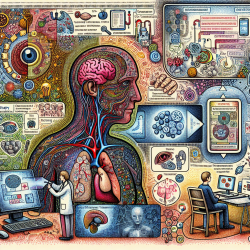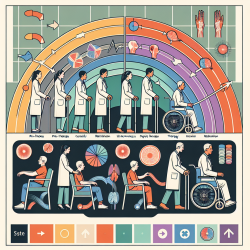As the world of healthcare continues to evolve, the integration of sensor, wearable, and remote patient monitoring technologies is transforming the landscape of clinical care. These advancements are not only enhancing patient outcomes but also necessitating the development of new competencies among healthcare practitioners. In this blog, we explore the findings of the scoping review titled "Sensor, Wearable, and Remote Patient Monitoring Competencies for Clinical Care and Training" and provide actionable insights for practitioners looking to improve their skills and adapt to these emerging technologies.
Understanding the Core Competencies
The scoping review identifies essential clinical skills needed to ensure quality care when using sensor, wearable, and remote patient monitoring technologies. These competencies are categorized into three learner levels: novice/advanced beginner, competent/proficient, and advanced/expert. Each level focuses on different aspects of patient care, medical knowledge, system-based practice, professionalism, practice-based learning, and interpersonal and communication skills.
Key Competencies for Practitioners
- Patient Assessment and Evaluation: Practitioners must develop the ability to gather and interpret data from various sensor and wearable devices. This includes understanding the device's purpose, its capacity, and how to integrate the data into clinical decision-making.
- Engagement and Interpersonal Skills: Building trust and effectively communicating with patients about the use of these technologies is crucial. Practitioners should be able to discuss the impact of these devices on patients' lives and address any concerns they may have.
- Management and Treatment Planning: Competent practitioners should be able to select appropriate devices based on patient needs, monitor ongoing use, and adjust treatment plans accordingly. They should also be proficient in using technology to enhance patient engagement and adherence to treatment plans.
- Professionalism and Ethical Considerations: Practitioners must adhere to ethical guidelines and ensure patient privacy and data security. This includes obtaining informed consent, managing data responsibly, and addressing any ethical dilemmas that may arise.
Implementing the Competencies in Practice
To effectively integrate these competencies into clinical practice, healthcare organizations should consider the following steps:
- Training and Education: Develop comprehensive training programs that cover the use of sensor and wearable technologies, focusing on the identified competencies. This can include workshops, webinars, and hands-on training sessions.
- Faculty Development: Invest in faculty development programs to ensure that educators are well-equipped to teach these competencies. This includes providing resources and support for ongoing professional development.
- Curriculum Integration: Integrate these competencies into existing curricula for healthcare professionals. This can be achieved by incorporating case studies, simulations, and practical exercises that highlight the use of these technologies in clinical care.
- Evaluation and Feedback: Implement robust evaluation methods to assess the effectiveness of training programs and the proficiency of practitioners. This can include written tests, oral presentations, and clinical outcomes assessments.
Challenges and Future Directions
While the integration of sensor and wearable technologies offers numerous benefits, it also presents challenges. These include keeping up with rapidly evolving technologies, ensuring data security, and addressing the ethical implications of using these devices. Healthcare organizations must stay abreast of these developments and continuously update their training programs to reflect the latest advancements.
As we move forward, it is essential for practitioners to embrace these technologies and develop the necessary competencies to provide high-quality, patient-centered care. By doing so, they can unlock the full potential of sensor and wearable technologies and contribute to the advancement of healthcare.
To read the original research paper, please follow this link: Sensor, Wearable, and Remote Patient Monitoring Competencies for Clinical Care and Training: Scoping Review.










